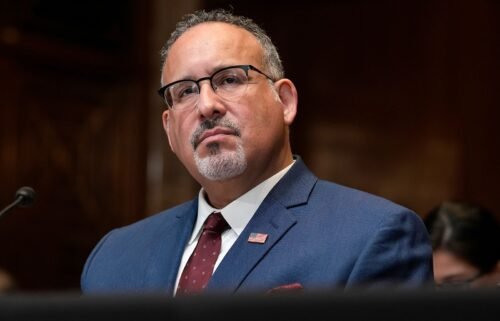The testimony from Trump’s White House chief of staff could change everything
CNN
By Jeremy Herb and Marshall Cohen, CNN
Atlanta (CNN) — Former White House chief of staff Mark Meadows rolled the dice on Monday with his opening move in the sprawling Fulton County election subversion trial: he took the stand himself.
For roughly three-and-a-half hours Monday, Meadows testified about his job at the White House and the chaotic post-2020 election period when then-President Donald Trump (and current Meadows co-defendant) sought to overturn the election result to stay in power.
Meadows sought to convince a judge that, as Trump’s right-hand man at the White House, his various attempts to block his 2020 election loss to Joe Biden were part of his official government duties.
If the judge agrees, the trial could end up moving from state court to federal court, a more advantageous legal spot for Meadows. That would dramatically upend the case brought by Fulton County District Attorney Fani Willis just two weeks after the grand jury indicted Trump, Meadows and 17 others on racketeering charges related to efforts to subvert the 2020 election results.
What unfolded in Atlanta on Monday was shocking by legal standards. Criminal defendants often take advantage of their constitutional right and decline to testify as part of their legal proceedings. And even smarter defendants decline to speak publicly about their case while it’s still ongoing.
“It’s a calculated risk to put a defendant on the stand at any time, certainly during pre-trial motions. And usually, the calculation goes against the defendant,” J. Tom Morgan, a former district attorney in DeKalb County, Georgia, said on CNN’s “Inside Politics” Monday. “I’m absolutely amazed that he is taking the stand.”
Putting Meadows on the stand gave prosecutors the chance to question him about the events after the 2020 election in a setting where his words can be used both against him and the other defendants in the Fulton County case – not to mention in special counsel Jack Smith’s federal indictment of Trump for election subversion.
Meadows is keen on moving the case out of state court because he’s arguing that he falls under a federal immunity claim extended, in certain contexts, to individuals who are prosecuted or sued for alleged conduct that was done on behalf of the US government or was tied to their federal position.
The upcoming decision by US District Judge Steve Jones matters to all of the 19 co-defendants – including the former president, whose lawyers are expected to file a similar motion as Meadows. (One of Trump’s lawyers was spotted in the courthouse Monday.) Four additional defendants have already made a motion to move their cases to federal court, too.
Jones, an appointee of former President Barack Obama, did not rule from the bench at the conclusion of Monday’s daylong hearing, but he noted the significance of the issue.
When Meadows’ attorney said at the conclusion of the hearing that his client was “entitled to a prompt determination,” Jones responded that he was likely going to take his time because he thinks the ruling will set precedent for other cases.
“If I don’t rule by September 6, then he should show up for the arraignment,” Jones said of Meadows.
Jones on Tuesday asked prosecutors and Meadows to file additional legal arguments about Georgia’s anti-racketeering law known as RICO, giving them a 5 p.m. ET Thursday deadline, indicating that he won’t rule on the matter before Friday at the earliest.
Meadows’ testimony wasn’t advertised beforehand
Meadows’ attorneys did not telegraph they planned to call their client to testify ahead of Monday’s hearing, while Willis had subpoenaed Georgia Secretary of State Brad Raffensperger, who was on the January 2021 call with Trump when Trump told him to “find” enough votes so he could win the state, and several others involved in the call.
Time and again, to bolster his case, Meadows connected his actions with his official position.
He tried to personally observe the signature-matching operation in Cobb County, Georgia, so that he would be prepared when the president asked him about it, Meadows testified. He said some of his contacts with state officials were partially about Covid relief funds, in addition to the Trump-fueled discussions about overturning the results.
Meadows claimed some of his election-related activities were done so he could effectively advise Trump about future legislation about election security – a puzzling argument, considering that Trump’s presidency was drawing to a close, and he has never been known to care much for the nitty-gritty of lawmaking.
The former chief of staff also grew somewhat exasperated as the prosecutor questioned why his role would include setting up a call to settle private litigation. At several points, he said he did not recall about the outreach he had conducted to set up the Raffensperger call.
“I dealt with the president’s personal position on a number of things. It’s still a part of my job to make sure the president is safe and secure and able to perform his job,” Meadows said. “Serving the president of the United States is what I do, to be clear.”
Politics is never far from the White House, he said.
“There is a role for the chief of staff to make sure those campaign goals and objectives are implemented at the federal level,” Meadows argued.
Meadows’ lawyer, George Terwilliger, said the job responsibilities are broad because the role of chief of staff is so closely intertwined with the operations of the federal government.
“But if he shot a demonstrator in Lafayette Park, that would obviously be outside the scope of his duties,” Terwilliger said.
Denying allegations
At the same time, Meadows answered questions under oath about some of the Fulton County district attorney’s charges against him and others in the case.
Meadows disputed allegations laid out in the indictment, saying that he never directed Trump White House aide John McEntee to write a memo about a strategy for “disrupting and delaying” the January 6, 2021, congressional certification of the election.
Because this was a pre-trial hearing, Meadows therefore was denying an allegation before seeing what evidence the district attorney had gathered to accuse him of it in the first place.
Meadows was asked to account for Trump’s falsehoods about election fraud. He was asked whether he thought Trump had lost Georgia and about then-Attorney General William Barr telling Trump the election fraud allegations were “bulls**t.”
The former chief of staff tried to dance around that question, saying that he believed at the time that “further investigation” was warranted, even though he “had no reason to doubt Mr. Barr’s” assessment that the fraud allegations were meritless.
That said, Meadows did acknowledge he had some interest in the result when asked by prosecutors if he had a personal stake in the outcome of the 2020 election.
Meadows quipped, “I can’t imagine I would be chief of staff for President Biden.”
The-CNN-Wire
™ & © 2023 Cable News Network, Inc., a Warner Bros. Discovery Company. All rights reserved.


